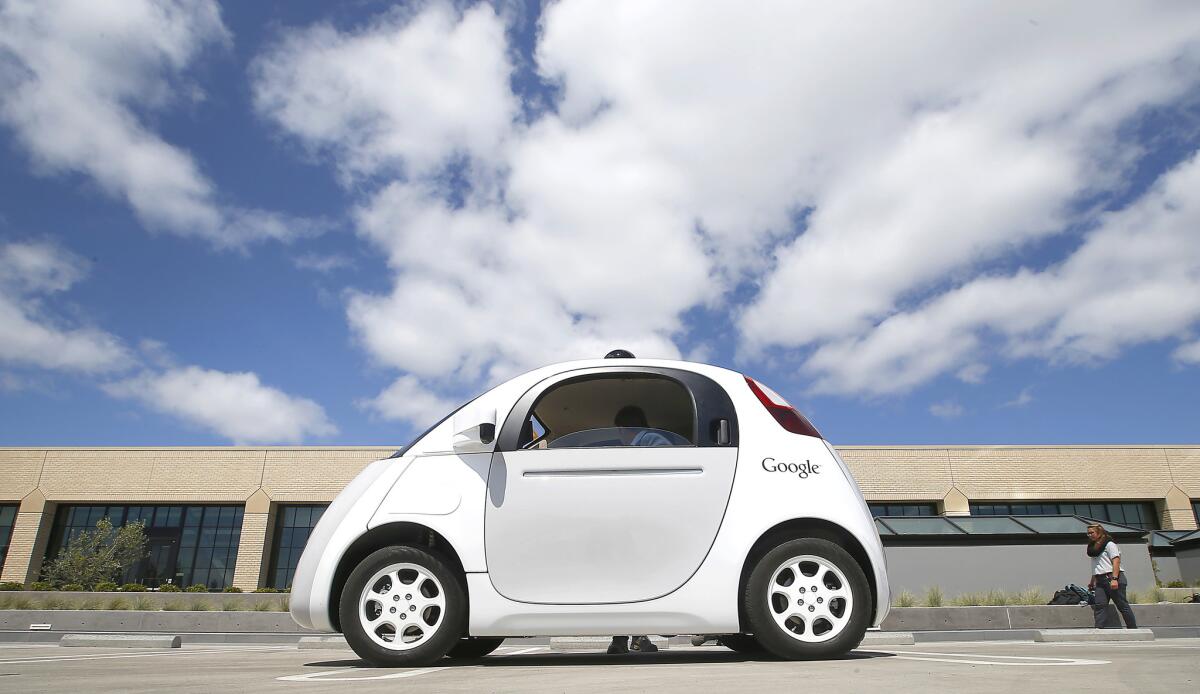Self-driving cars aren’t ready yet: Here’s how often human drivers need to grab the wheel

Google’s self-driving prototype car at the Google campus in Mountain View, Calif., in May.
- Share via
As automakers develop their self-driving car technologies, human test drivers still sometimes have to take the wheel.
The California Department of Motor Vehicles released the first reports from seven automakers working on autonomous vehicle prototypes that describe the number of “disengagements” from self-driving mode from fall 2014 through November.
This is defined by the DMV as when a “failure of the autonomous technology is detected” or when the human driver needs to take manual control for safety reasons.
See more of our top stories on Facebook >>
Google Inc. reported 341 significant disengagements, 272 of which were related to failure of the car technology and 69 instances of human test drivers choosing to take control. On average, Google experienced one disengagement per 1,244 miles.
The average driver response time was 0.84 of a second, it said.
Most of the cases in which drivers voluntarily took control of the car involved “perception discrepancy,” or when the car’s sensors did not correctly sense an object such as overhanging tree branches, Google said.
“Disengagements are a critical part of the testing process that allows our engineers to expand the software’s capabilities and identify areas of improvement,” the company said in a statement attached to the report. “Our objective is not to minimize disengagements; rather, it is to gather, while operating safely, as much data as possible to enable us to improve our self-driving system.”
Bosch recorded 625 disengagements, or about one per mile, and Delphi Automotive totaled 405, or one per 41 miles.
Nissan North America Inc. reported 106 disengagements, which breaks down to one per 14 miles; Mercedes-Benz Research and Development North America Inc. listed 1,031, or one every two miles; and Volkswagen Group of America Inc. totaled 260, or one every 57 miles.
Tesla Motors Inc. said it did not have any disengagements from autonomous mode. It did not report how many miles its self-driving cars had traveled.
In December, the DMV released draft rules that would require self-driving cars to include a steering wheel and have a licensed driver ready to take over control.
In a statement, John Simpson, privacy project director for Santa Monica-based Consumer Watchdog, said Google’s results underscore a need for human drivers to be behind the wheel of self-driving cars. His statement was released before other automakers’ reports were posted online by the DMV.
“The DMV got it exactly right and is putting our safety first,” he said.
Most of the reports detailed how many miles each company’s vehicles logged. Google came out on top with 424,331 miles on public roads, followed by Delphi with 16,662 miles and VW with 14,945 miles.
For more business news, follow @smasunaga.
MORE FROM BUSINESS
Kmart to close several stores, including 4 in California
ESPN.com to cover e-sports with same ‘rigor’ as it does the big leagues
Woman sues Broadcom billionaire for $70 million, saying he abused her and vowed to support her







